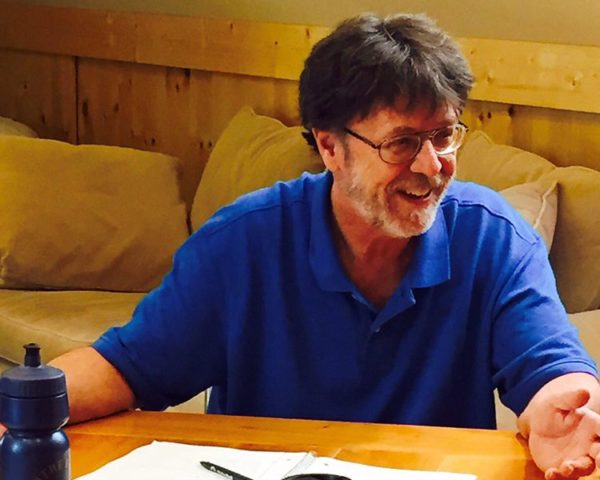
05 Feb Ah Haa: Paul Evans, 20/20 – 100 Years of Art/Politics/Thought, 2/20–2/22
In the department of the best things in life are free, Paul Evans returns to once again razzle-dazzle his audience with three more engaging lectures at Telluride’s Ah Haa School for the Arts. The dates are Wednesday – Friday, Feb. 20 – Feb. 22, 2019, 5:30 – 7:30 p.m. His subject: “20/20 – 100 Years of Art/Politics/Thought.” The bottom line: based on the evidence, Evans is optimistic about the future and his lectures are a gift to the greater Telluride community, a no-miss event.

Paul Evans, cultural critic. Lectures 2/20 – 2/22.
Chaos is the science of surprises, of the nonlinear and the unpredictable. It teaches us to expect the unexpected. While most traditional science deals with supposedly predictable phenomena like gravity, electricity, or chemical reactions, chaos theory addresses nonlinear things that are effectively impossible to predict or control like turbulence, weather, the stock market, our brain states, art and life in general.
One tenet of chaos theory allows that small changes in initial conditions lead to drastic changes in the results.
Chaos also explores the transitions between order and disorder, which can and often does occur in surprising ways.
As in improvisation – a term and idea that applies equally to music (free jazz, scat, bebop); fine art (Kandinsky, Picasso, Pollack and Action Painting or Abstract Expressionism); the written word (Kerouac’s word-jazz, Burroughs cup-ups); free-style rap (think Robin Williams), improv comedy, etc.
Paul Evan’s first lecture is titled “ARTS: Chaos Theory – The Improvisatory Impulse.”
The heart or art of this manner, according to Evans, is the idea of a dialectic, a term used to describe a method of philosophical argument that involves some sort of contradictory process between opposing sides of a proposition. For example – an example Evans will wax rhapsodically about – is the received or given form of a song are its established chords, which change in opposition to its antithesis, a musician’s intuitive inspiration freed, in the case of jazz, as improvisational riffs – which lead to drastic changes in the results as stated above.
In his opening shot, the underlying question Evans will ask and answer is this: What’s the difference between improv and noise?
Lecture #2 is titled “POLITICS – Sisterhood is Powerful; Forever Feminism.”
First it was Lilith, (not Eve), and now, well, it is the many fresh faces in the freshman class of the House of Representatives under the leadership of Speaker Pelosi, strong, assertive women out to change the world. In this talk, Evans will focus on Shulamith Firestone, a radical feminist, artist Kate Millet, and 5th Wave developments, starting with First Wave Feminism and the passing of the 18th Amendment in 1919 (the law went into effect on January 17, 1920) and landing on the doorstep of #Me Too.
The subtext of the evening is “What’s with the ‘Failure of Feminism’?” and “Where’s feminism’s place within the context of the dream of human liberation?”
Evening #3 is all about “THOUGHT – Inner Revolution, Alternative Spirituality.”
Of all the names associated with modern spirituality, that of Madame Helena Petrovna Blavatsky—or HPB, as she preferred to be called—is surely one of the most controversial. Although the woman died more than a century ago, Blavatsky’s name still turns up in serious discussions about “ancient wisdom,” “secret teachings,” and “inner knowledge.” It is generally agreed that her Theosophical Society, (which she founded in New York in 1875, with her colleagues Henry Steel Olcott and William Quan Judge), was more or less the official starting point of the modern spiritual revival.
In his final talk, Evans will take his audience on a magical mystery tour that begins with Paramahansa Yogananda opening the first US Self Realization Fellowship Center in 1925 to where we are today: SBNR – Spiritual But Not Religious (or Millennial Spirituality), tripping the life fantastic over hallowed grounds that begins at Blavatsky’s table and ends with Lululemon and veganism. En route, Evens will stop for a long moment to ask if the current state of affairs comes down to a move to supplant Aristotle with Plato, replacing the empirical, practical and commonsensical with the abstract and Utopian.
The key questions of that evening are Why does the NPR mindset sneer at anything labeled “New Age”? How can the Ancient Archetypes (Jesus, the Buddha, the Scriptures) serve us now?
The Big Idea behind all three lectures is this: 2020 is fast approaching, so why not trace three significant thought-streams back to their 1920’s origins, navigate their currents, and see where we are headed? One hundred years and two World Wars, Holocaust, HIV, the Tyranny of Tech and . . . Trump.”
“It’s been a rocky ride, but our take on the trip will be celebratory – the keynote: LIBERATION,” says Evans.
Paul Evans, more:
Co-author of “The Rolling Stone Album Guide,” Paul Evans is a culture critic who’s written on arts/politics/religion/psychology/science for publications ranging from the LA Times to Entertainment Weekly. From his first job – at 16, writing greeting cards, to speech-writing for Ted Turner’s girlfriend, to making CDs, and teaching philosophy, he’s found the Life of the Mind to be the sweetest spot. A regular visitor to Ah Haa, Evans has delivered lectures/multi-media presentations on subjects ranging from Picasso to the Beatles, Bipolar Illness and Creativity, the Plato/Aristotle Debate, and Why the Beatles Still Matter.
An enemy of cynicism, he celebrates the heart/mind/soul.
Paul Evans now teaches English at BASIS Oro Valley School in Tucson, AZ.


Sorry, the comment form is closed at this time.